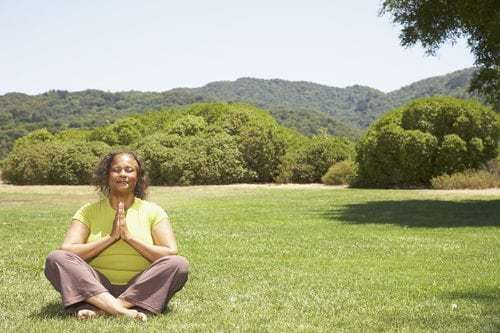Meditation is a mind and body practice that can increase calmness and physical relaxation, improve psychological balance, help you cope with illness, and enhance your overall health and well-being. Recent studies have even suggested that meditation can improve memory and your brain’s ability to process information. But the benefits of meditation for seniors don’t end there. Meditation’s accessibility makes it a great health practice for people of all ages.
What Is Meditation?
Meditation is simply a state of consciousness, when the mind is free of scattered thoughts and other distractions for a period of time. During meditation, you focus your awareness on a single thought, sense, or object. You are meditating when you focus on your breath, or when you actively listen to birds on your walk. As long as the activity is free from any other distraction, it is effective meditation.
There are many types of meditation, but most practices have four elements in common: a quiet location with as few distractions as possible, a specific and comfortable posture, a focus of attention, and an open attitude (source).
Tips for Beginners
- Find free resources. There are loads of free podcasts, videos, and information on how to meditate online. Some videos will even guide you through the process. These resources can be a big help when you’re starting out.
- Start small by meditating three to five minutes (or less) a day. Then increase your time as you get the hang of it.
- Try different postures. You can meditate while sitting, lying down, or even while walking. Find a posture that works for you.
- Focus your attention. You can focus on a chosen word or set of words, an object, or the sensations of the breath.
- Keep meditation goals attainable. Start simply, by noticing when your mind wanders, and redirecting your attention back to your point of focus without criticizing yourself.
- Keep an open attitude. Let distractions come and go naturally without judging them, and don’t give up!
Benefits of Meditation for Seniors
According to the U.S. Department of Health and Human Services, there’s evidence that meditation may reduce blood pressure, as well as symptoms of irritable bowel syndrome, and flare-ups in people who have had ulcerative colitis. It may ease symptoms of anxiety and depression, and may help people with insomnia. Plus, some studies have found that meditation may be beneficial for managing chronic pain and reducing general fatigue.
Meditation and Your Brain
One of the most significant benefits of meditation for seniors is that it may slow, stall, or even reverse changes that take place in the brain due to normal aging. In fact, in a study conducted by Harvard neuroscientist Sara Lazar, results showed that 50-year-old meditators had the same amount of gray matter in their prefrontal cortex as 25-year-olds (source).
To rule out the possibility that those meditators simply started out with more gray matter, she conducted another study. This time, she took people who had never meditated before and told the experimental group to meditate for eight weeks. Afterward, Lazar found differences in their brain volume in five different regions of the brain:
- The posterior cingulate, which is involved in mind wandering and self relevance
- The left hippocampus, which assists in learning, cognition, memory, and emotional regulation
- The temporo parietal junction (TPJ), which is associated with perspective taking, empathy, and compassion
- An area of the brainstem called the Pons, where a lot of regulatory neurotransmitters are produced
- The amygdala, the fight-or-flight part of the brain that is important for anxiety, fear, and stress in general
The first four areas of the brain grew, meaning the experimental group increased their brain’s ability to process new information, remember, show empathy, understand perspective, regulate emotions, and more. But the amygdala shrunk, meaning the group had lower levels of stress and anxiety after meditating for just eight weeks.
Considerations
The physical and psychological health benefits of meditation for seniors continue to surprise and excite researchers. With meditation, you have a simple and accessible practice that literally changes your brain. However, meditation shouldn’t be used to replace conventional care or as a reason to postpone seeing a healthcare provider about a medical problem. Tell all your healthcare providers about any complementary or integrative health approaches you use. Give them a full picture of what you do to manage your health. This will help ensure coordinated and safe care.
Are you looking for an assisted living community in Tennessee? If so, be sure to check out Hearthside Senior Living Place, located in Bartlett, Tennessee. We would be happy to schedule a tour for you so that you can explore the community, meet some of the residents, and ask any questions you might have. For more information, please call 901-854-6590. We look forward to meeting you!

